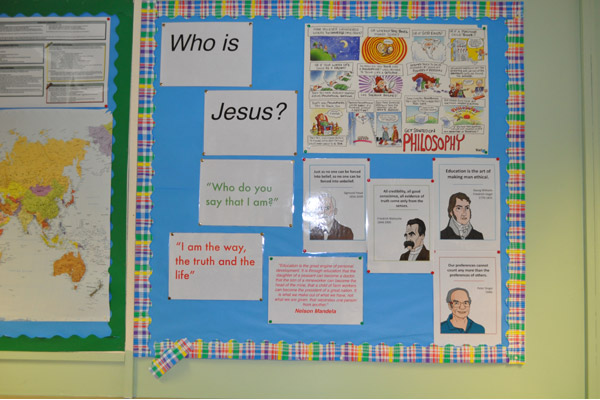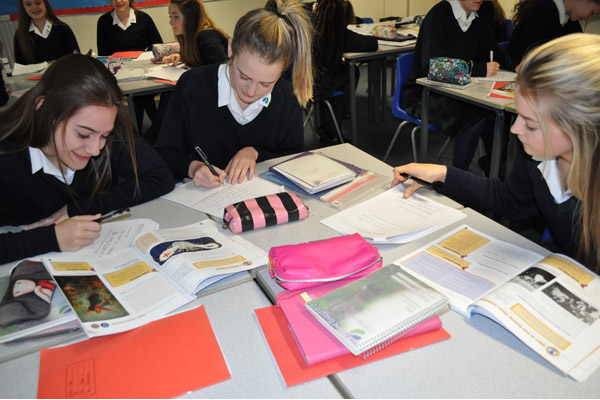“When I do good, I feel good. When I do bad, I feel bad. That’s my religion” – Abraham Lincoln
Religious Education is important for a variety of reasons, some which you may not expect. Religious issues and conflict arising from beliefs frequently top the news agenda and RE helps make sense of them. RE allows young people growing up in a diverse society to understand the views and opinions of people whose beliefs and values differ from their own. The RE classroom provides space for young people to reflect on their own ideas and develop their thoughts about ‘big questions’ and ethical issues. This allows young people to handle issues in their lives, preparing them for the workplace and adult life.
KEY STAGE THREE CURRICULUM
Students study a range of topics at Key Stage Three.
In Year 7, students consider ‘What is Belief’. This is an introduction to the beliefs of some of the major worldwide religions; Buddhism, Christianity, Hinduism, Islam and Sikhism. This is followed by a second topic of ‘What happens when we die?’ which is an introduction to the basic beliefs about what some of the major religions believe happens after death. There are strong links in this topic to the scientific theories. Assessments are based around the two main skills needed to do well at Key stage three; ‘learning about religion and learning from religion’
In Year 8, students investigate the topics of prejudice and racism which is an introduction to different types of discrimination and prejudice and an examination into why people are prejudiced. We explore significant individuals who have contributed to the Civil Rights Movement. Students also study the topic of war and peace which is an introduction to the concept of Just War/Holy War. They also consider reasons for going to war and whether any kind of war is justified for people of faith.
In Year 9, students consider three topics. They first look at ‘Sanctity of Life’ which is a brief introduction to ethics. It includes religious views about the sanctity of life and ethical dilemmas such as abortion, suicide, euthanasia and capital punishment. This is followed by the topic ‘How did we get here’ which looks at religious beliefs about the origins of the universe and mankind. We complete the year by studying the concept ‘Are we doomed?’ which is centred around religious beliefs about how the world will end.
KEY STAGE FOUR CURRICULUM
Students study OCR Religious Studies B (Philosophy and Ethics) J621. The GCSE is made up of Four Units;
Unit 1 B601 PHILOSOHPY 1: The Nature of Deity, Religious Experience and End of Life
Unit 2 B603 ETHICS 1: Religion and Human Relationships, Poverty and Wealth and Medical Ethics
Unit 3 B602 PHILOSOPHY 2: Good and Evil, Religion Reason and Revelation and Religion and Science.
Unit 4 B604 ETHICS 2: Peace and Justice, Religion and Equality and Religion and the Media
A LEVEL CURRICULUM
Students have opted to focus on A level Philosophy for the academic years 2014-2016. In the past students studied OCR Religious Studies, but as the department is very flexible in its approach, from September 2014, due to demand we offered pure Philosophy. This is AQA Philosophy (2170). There are two units at AS and two units at A2.
Unit 1 – An Introduction to Philosophy 1 and Unit 2 – An Introduction to Philosophy 2 – AS examination
Unit 3 – Key Themes in Philosophy and Unit 4 – Philosophical Problems – A2 examination.
DIGITAL LEARNING
The RE Department uses digital learning in a variety of ways. The main use in RE is for research purposes as students will always achieve the highest levels and grades by looking at different interpretations of an event, particularly if the issue is currently in the news.
WHERE DOES RE LEAD YOU?
Religious Education is a useful complementary course for students pursuing arts or science subjects and it leads to an academic qualification fully recognised and valued by all universities and employers. Both are now fully aware that the Religious Education course develops students’ analytical and evaluative skills; skills that are easily transferable. Former students who have taken GCSE Religious Studies at the school have gone on to study Theology, Classics, Law, Physics and Politics. These, and others, have successfully established themselves in a wide range of careers.
STAFF NAMES
Mrs Susan Casey – Head of RE
Mr Gert Cornelissen – Teacher of RE and Philosophy

